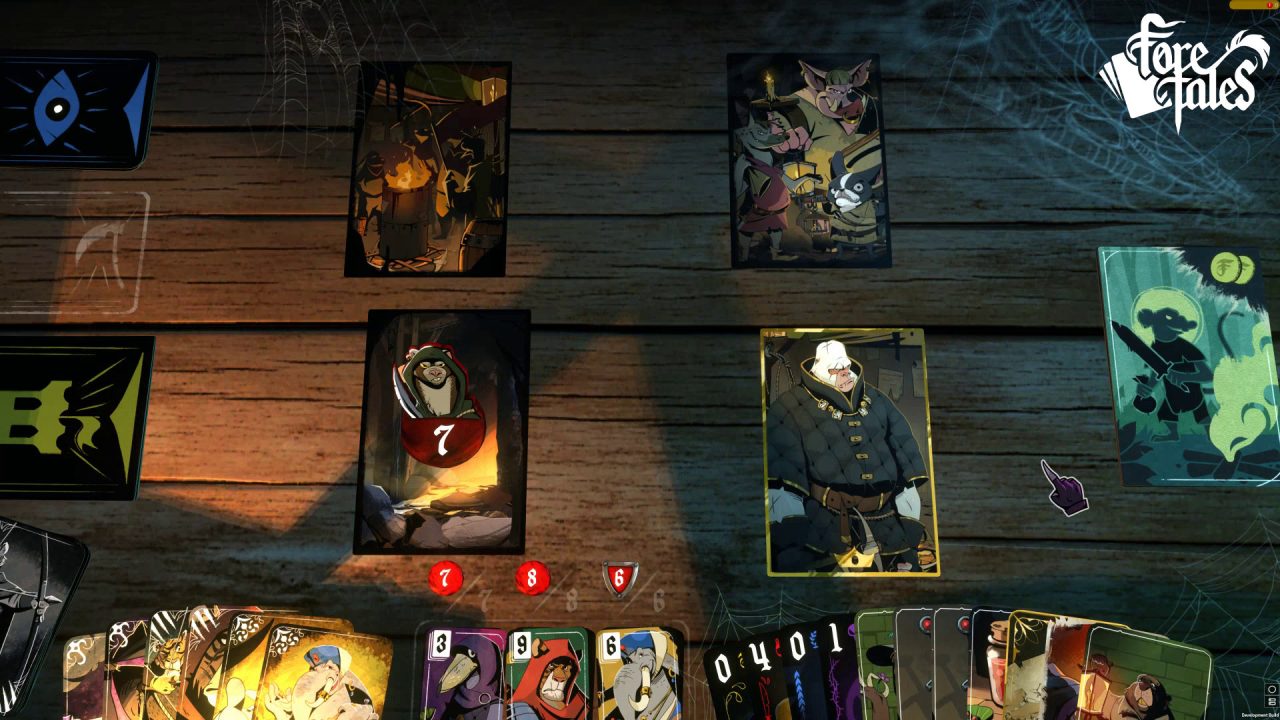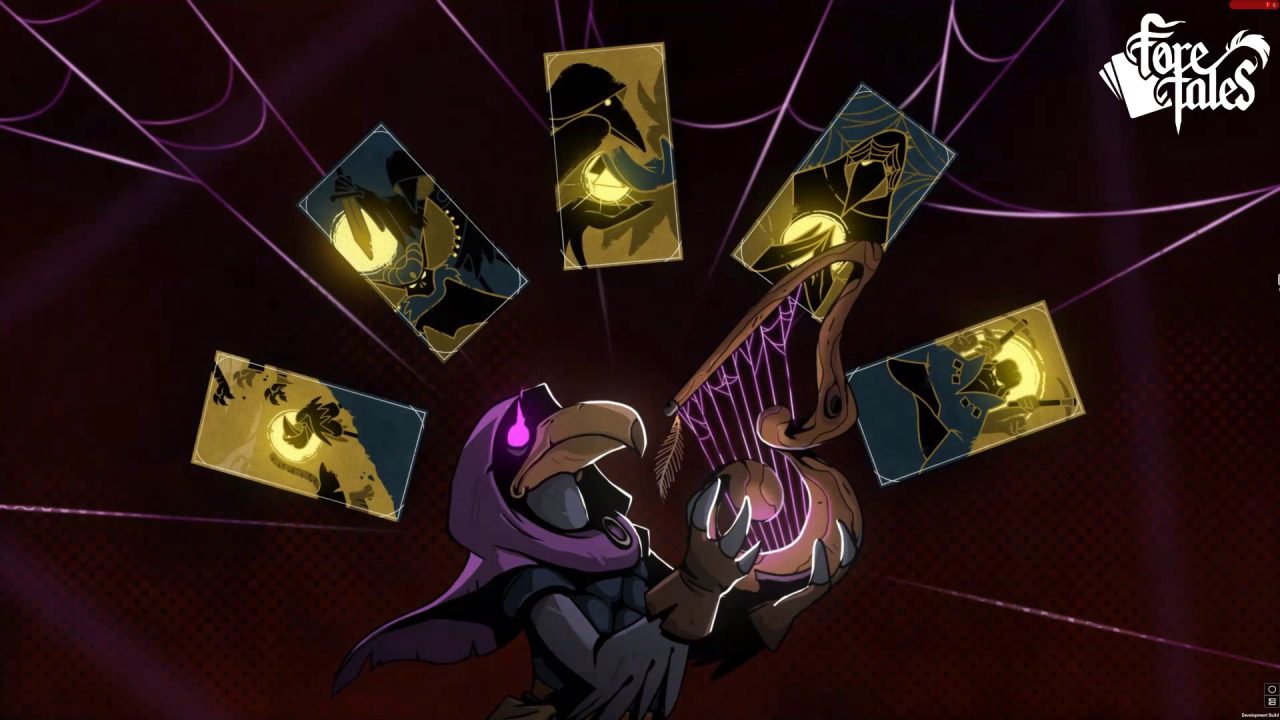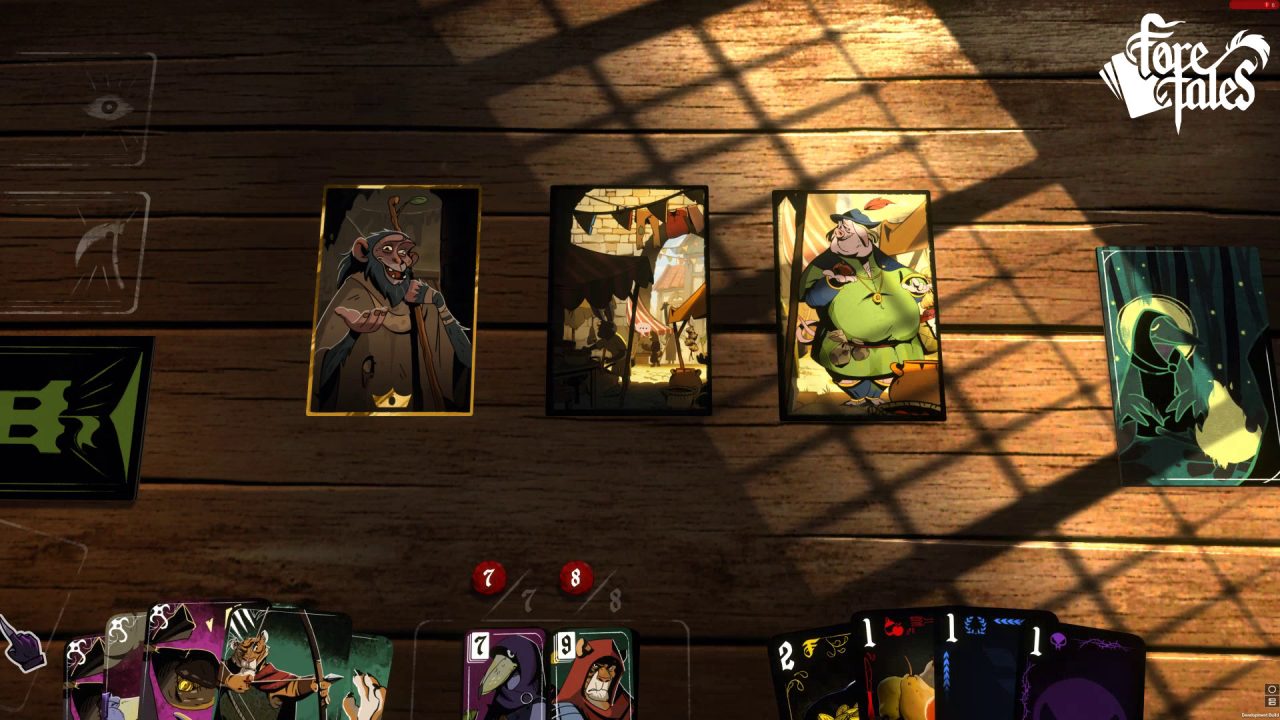Cards, cards, cards. Wow, the gaming industry just can’t let these things go. Somehow with all the advancements in technology and variability in game design, we’ve defaulted to mimicking a physical medium with less visual complexity than many games developed more than ten years ago. Mind, this isn’t a complaint: I love cards. Clearly, I’m not alone in this. Fortunately, Foretales isn’t another Slay the Spire clone; its card usage relies almost singularly on storytelling and navigation.
Pretend you’re sitting at a table across from a friend who’s the dungeon master. You’re by your lonesome and have a character or two with their own deck. Your friend lays out four cards with pictures of locations on them. They say, “Okay, play any ability card you want from either of your characters on a location, and I’ll tell you what happens.” Kinda sounds like Dungeons & Dragons, right? That’s essentially what’s happening here.
In Foretales, you are Volepain, a thief who travels with a mercenary, Leo. Volepain and Leo set out to earn riches for an early retirement, but wouldn’t you know, something bad happens, and now Volepain has to save the world. After retrieving a mysterious lyre for a similarly mysterious client, he begins to have visions of terrible fates that not only befall his home but those close to him. He soon realizes that he’s under a time limit to change the future, all while trying to understand why he’s having visions and what the lyre does.

To do this, players navigate locations placed (as referenced earlier) using a set deck of cards unique to each character. Volepain’s deck is characteristically thief-related, containing cards like pickpocketing, smoke bombs, and eavesdropping. Leo’s deck includes survival and combat-related cards. Though, as the game never stops pointing out, combat is discouraged.
If you want to play the game your way and not follow the game’s suggested conventions, you can absolutely fight guards and bandits. Sometimes location cards will have enemies placed on top of them, which means Volepain and crew will have to dispose of them somehow to access that location. Again, the game constantly tells you that combat isn’t the only way to solve problems and will chastise you endlessly for doing so. When entering combat, players can choose to dispose of the enemies through various methods, with an extensive array of options.
Each character’s deck isn’t the only resource. Players will accrue fame, infamy, money, food, and an assortment of miscellaneous items to use when navigating locations or in combat. With enough fame, infamy, or money, guards and bandits can be essentially bribed out of combat. Do this to enough of the enemies in the party, and the morale will drop below zero, with no bloodshed needed. On the other hand, if players want to go the combat route, Leo has powerful cards for doing so, which can end battles swiftly. If you don’t want to or don’t have Leo’s combat cards, then you can fight the old fashion way by smashing into the other card; battle is considerably simple. The game also gives players throwing knives, Molotov, and allies to assist combat. If combat is such a taboo, why are so many tools thrust upon the player to make it easy?

Combat aside, most ability cards have unique interactions with different locations. Sometimes, a card will replace a location and pull the top card from the deck, while other times, a specific interaction is highlighted. This highlighting tells what happens as a function of gameplay, with the text and dialogue supplying the flavor to drive the story. For example, players can interact with merchants using gold coins, pickpocketing, killing, using fame or infamy, and so on. Each might offer a slightly different reward, penalty, or combination thereof. In this example, paying the merchant is a relatively straightforward interaction with a predictable outcome. Killing the merchant outright will undoubtedly grant the item at no cost but will add enemies to the watch deck. When some locations pop up, they may have an eye, which leaves a chance for enemies to be pulled from the watch deck to cover up that location, requiring more combat than the player may want.
In this way, Foretales quickly becomes a sort of puzzle and resource management game, as players want to avoid combat as much as is reasonable but also try to find secret paths to victory in a mission while creatively using cards in different locations. Sometimes a card does not replace a site but instead places a new card on top. For instance, if Volepain eavesdrops on a conversation in a tavern, he may find a unique person or object in the tavern; these special cards are sometimes only obtainable through a specific card and location interaction. Some players will fall in love with this mechanic because there’s an element of chance, as characters will only ever have two or three cards in their hand, each out of a deck of several different cards. Other players will hate this and roll their eyes at not having the right card at the right time. The game tries to correct this by allowing players to swap out cards in their hand with one in their deck or discard, but most of the time, players won’t even know if there is a unique interaction.
Personally, I love this method of storytelling and gameplay. Foretales offers a sense of curiosity, wonder, and excitement when, after seeing a new location repeatedly, I have the right card at the right time and discover a new interaction just now. By that same token, I am seeing the same location over and over for literally hours of game time. This is a huge problem; Foretales is flooded with the same location cards. I was in towns or forests for the first half of the game. I’m sure the practicality of an indie studio making a game led to resource woes, but variety is critical for a game like this. I got sick of always seeing forest paths and town square cards. Even when new cards showed up, the setting was a town or forest, so I felt forced to eat vanilla or chocolate for every single mission initially.

What’s more, Foretales lacks a sense of progression in terms of gameplay. Players will never get to customize their decks or upgrade their characters, except for rare moments in which a character gains one max hit point (gasp) or a new card in the deck. After each mission, players lose all gathered equipment and currency except for gold cards, but gold cards are also quite uncommon. The characters don’t grow in terms of complexity, and sometimes they act inconsistently. Leo, for example, does most of the killing in each mission, but he will chide Volepain for killing people after a mission’s completed. The characters never really bond or learn lessons no matter what extreme affair occurs. They feel as if they’re hollow husks just going from one task to the next.
If I’m being fair, though, I have absolutely enjoyed my time with Foretales. As much as the monotony of the same locations and enemies wears on me, I constantly read the descriptions of new enemies or places that came out because this aspect of the writing is polished. The text is flavorful and tight. Not only that, I authentically enjoyed trying to puzzle out how to find secret solutions or objectives that might branch the story out in unique ways. Foretales certainly has forks in the road, and sometimes the simple solution presented immediately might not be the right one—for you.
Visually, the anthropomorphic characters pop off the screen. The developers have stated that Disney’s Robin Hood movies inspire the artwork, and it shows. The location cards serve their purpose as they represent mines, forests, and towns, but they don’t really add any flair. The table the cards are placed on and various other amenities add a satisfying appeal, but the lack of robust animations may leave a modern audience wanting. Audibly, the game’s music doesn’t stand out. However, the narrator, whom some may recognize from Critical Role (Travis Willingham), does a fantastic job.
Foretales easily fits as al so-much-potential game to me. The skeleton’s there: I love the branching paths, the core game design and how the cards are used, the presentation, and how well-hidden secrets appear to be, but there’s not enough flesh on those bones. Whether trying to create a tight, controlled experience that doesn’t get away from them or just not having enough resources to add a huge variety of cards, Foretales suffers. This title has the trappings of a phenomenal, top-tier experience but is just far too repetitive and slow.


